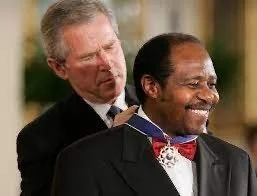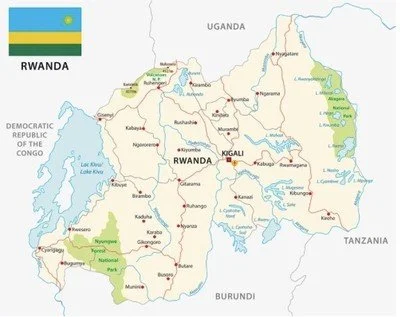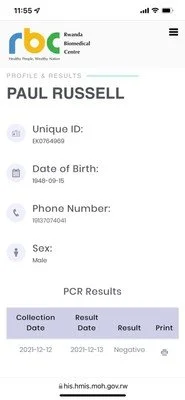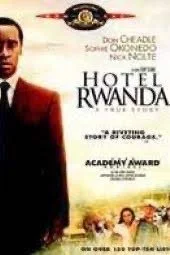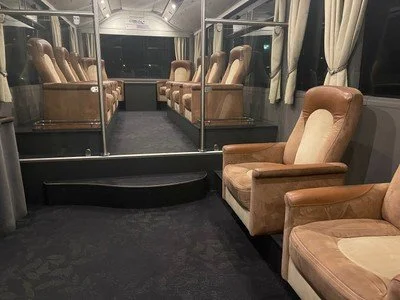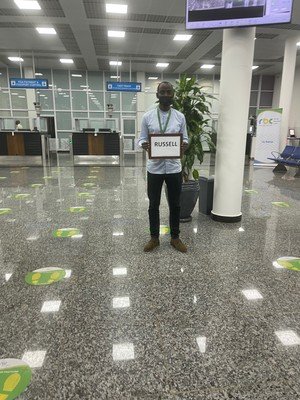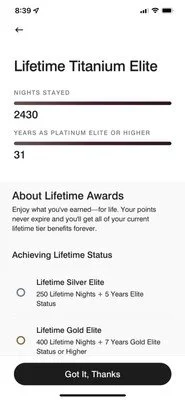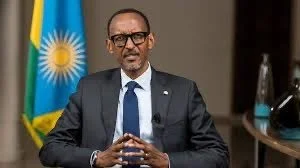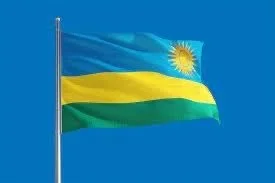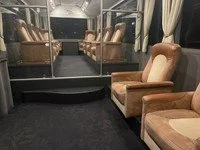Chapter Seventeen: Kigali, Rwanda
Let's wait for a COVID test to come back, shall we?
12.13.2021 - 12.13.2021 75 °F
View Morocco + Uganda + Rwanda on paulej4's travel map.
We arrive Kigali International Airport on time and, as the only business class passenger, I find myself the sole occupant of the fancy shuttle bus from the aircraft remote parking station to the terminal building I am met by Nshuti who clearly knows his way around. Paperwork and still another COVID test completed, I am whisked by Sam, my driver/guide for the week, to the Kigali Marriott Hotel, with no traffic about 25 minutes away. After working my way through a crowd and the long delay that creates, the check-in person looks at my Marriott Bonvoy number, sees that I am a Titanium Elite Member (31 years in their program, 2,428 nights stayed--no that is not a typo), and upgrades me to a suite. I get to quarantine in style. Sort of. This Marriott is reminiscent of the Marriotts we all used to know: full service, big lobby, fancy driveway with bellman on duty, big lobby bar to one side, bank of four elevators on the other side--remember those? Now it seems to be all Fairfield Inns, Courtyards, or even W's or Editions. This building is more attuned to JW Marriott standards and I feel at home in it. The staff? Well, they don't perform to even half the standard of the Ugandan lodges where I have spent past days.
This Christian country (mostly Catholic) is the spot where, just 27 years ago, one tribe—the Hutu people—slaughtered up to one million members of another tribe—the Tutsi people—in just 100 days. Perhaps partially as a result of that, Rwanda has among the youngest populations on earth: the average age here is 19. Please re-read these last two sentences and let that sink in. One Million Slaughtered In One Hundred Days.
The Republic of Rwanda: “The Land of 1,000 Hills” is land locked, bordered by Uganda, Tanzania, Burundi and the Democratic Republic of the Congo. Rwanda is home to savanna, mountains, lakes and the Volcanoes National Park where one-third of the planet’s mountain gorillas roam the forest. Kigali, where I am today, is the capital city.
The Kigali Marriott is my temporary home, less than two miles from the infamous Hôtel des Mille Collines, focal point of the motion picture Hotel Rwanda starring Kansas City native Don Cheadle as Paul Rusesabagina who, back in 1994, reportedly saved over 1,000 Tutsi refugees from death at the hands of the murderous Hutu revolutionary army. The 2004 film was not shot here but two others were: HBO’s Sometimes in April in 2005 and a Canadian production Shake Hands with the Devil in 2007.
So what happened to Paul Rusesabagina, the man to whom President George W. Bush presented the Presidential Medal of Freedom? Here is a quote from the BBC dated less than three months ago: "A man who was portrayed in a film as a life-saving hero during the Rwandan genocide has been sentenced to 25 years in prison for terrorism by a court in Rwanda. Paul Rusesabagina, 67, was found guilty of backing a rebel group behind deadly attacks in 2018 and 2019. (note: that is quite recent) Rusesabagina's family said he was kidnapped and forcibly taken to Rwanda last year. But in court, one witness spoke about how he had tricked, rather than forced, Rusesabagina onto a plane in Dubai by telling him it was flying to neighboring Burundi, not Rwanda. Given that Rusesabagina used his fame to criticize the government from abroad, this was an especially significant case. He reportedly also presented himself as a potential political challenger to Rwandan President Kagame."
President Paul Kagame is and has been President since 2000—he was reelected in 2017 with 98.79% of the popular vote. Prior to a 2015 referendum approved by 98% of voters, Article 101 of the Constitution, stated: “[t]he President of the Republic is elected for a term of seven years renewable only once. Under no circumstances shall a person hold the office of President of Republic for more than two (2) terms.” But the now revised law eliminates the seven-year term and permits presidents to serve two five-year terms, beginning in 2017. But, too clarify, that means that after President Kagame serves the rest of this seven-year term, under the terms of the new law, he can start all over and then run for two more five-year terms. If successful, he would be President for 31 years, until he is nearly 80 years old. President Kagame began his political rise as he had been the leader of the Rwandan Patriot Front which defeated "Hutu extremist forces" and ended the 1994 genocide. Did you follow all of that? It's complicated. I had to re-read, re-sort and re-think all of this as I wrote it.
Why did the Hutus decide to commit genocide against the Tutsis in the first place? Maybe, if you read the book Caste, an explanation lies. Tutsi kings dominated for 100 years before Germany colonized the country—but the German occupiers allegedly still favored Tutsis. Belgium invaded during World War I and reportedly continued to favor Tutsis. In 1959, the Hutus had enough. They massacred many Tutsi people in the process of revolt and in 1962 established a new republic that they, the Hutus, could dominate. Civil war followed in 1990. Pro-Hutu President Juvenal Habyarimana was assassinated in 1994 and the genocide quickly followed. The Tutsi-led Rwandan Patriotic Front ended the genocide by way of military victory soon after but the horrendous, unimaginable damage had been done.
The flag’s light blue band represents happiness, yellow economic development and green hope for prosperity in the future. The yellow sun symbolizes enlightenment. Subsistence agriculture without modern equipment predominates. Some coffee and tea is exported. Mining of cassiterite, wolframite, coltan for mobile phones and gold contributes as well. Gay rights are mostly unheard of.
In terms of corruption, Transparency International, a German based NGO, ranked the country as the fifth “cleanest” out of the 47 Sub-Saharan African countries. That helps boost Rwanda’s economy by making it a perceived safe-haven for tourists like me. We tourists mostly head for Volcanoes National Park which got its name because it is home to five dormant volcanoes: Karisimbi, Bisoke, Huhabura, Gahinga and Sabyinyo. Eight thousand people fled here from the Democratic Republic of Congo in May of this year when Mount Nyiragongo, a very active volcano that is less than 40 miles northeast of here, erupted. (How common are volcanic eruptions? There were 68 of them in 2021)
It is the mountain gorillas of Volcanoes National Park that attract me and thousands of others to ignore all you just read and to pay for permits to visit gorillas in the hills. I have dreamed of this opportunity for many years. After two COVID-caused postponements, and these last few days in Uganda, I am finally here. This is, if my count is correct, the 127th country I have been privileged to visit. I learn as I was making my way here that friends Donna and Ward Katz have made this trip and consorted with the gorillas here. I'll ask around and see if anybody remembers them.
As I write this, my phone dings. This arrives: I am in no way surprised that I tested negative. After all, I tested negative 36 hours prior to that test and a few days prior to that test and a few days prior to that test and a few times prior to that--all within the window of this journey. Even so, when so much is on the line--one's health and one's ability to depart from and arrive into various countries or to board various flights or to check into various hotels or to have documentation to be able to dine in a restaurant, well, it is still stressful. And, just so that you can put this into perspective, I must get either two or three more covid tests as I move about Rwanda and then another one--with Cianán--when I arrive and get to see him in Brussels. At around $60 USD a pop--when they are free to me in the U.S. thanks to our socialized medicine scheme known as Medicare--and with the time involved, it is a major undertaking to travel right now--one that many would reject as being too arduous and stress inducing.
But, with this test I can have breakfast in the restaurant. I can walk twelve minutes from here to Hôtel des Mille Collines just to get a feel for the place. I can sit by the pool and read. I can relax without stress. And I can know that there is no way that I will infect anyone else--including a few innocent gorillas--while I do all of those things. That's the funny thing about covid, isn't it? You don't want to get it, in part, because you don't want to be the one who gives it to someone else. All the inconvenience isn't about me; it is about others and for that reason, i am all for it.
I took a walk this afternoon--after a downpour prevented me from going earlier--to find the Hôtel des Mille Collines--it looks nothing like it did in the movie. On the way back to the Marriott, I note that Rwanda--like Uganda--seems to be devoid of smiling people. Once I entered the Marriott, I decided to observe the staff at work for a while. They, too, do not smile. I am a meddlesome bastard who recalls the importance of customer service so I decided to figure out who the GM is here. A bit of internet snooping delivered his name, Matthias Widor. I emailed him and we met for a discussion. He has been here exactly eight days having come from Abu Dhabi. His second in command has been here the same amount of time. The property is coming off the most difficult of times. Covid not only emaciated the hotel, it closed the country. The staff suffered with some off work with no income for months and a skeleton staff serving diplomats and the like who could still travel. Mr. Widor has his work cut out for him but from our conversation, I would not bet against him.
Sam picks me up at 8:30 in the morning. My first stop is the Kigali Genocide Memorial Centre. My niece, Betsy, has visited here and has prepared me for how moving it is. After lunch, Sam takes me north to Ruhengeri and the Volcanoes National Park.
